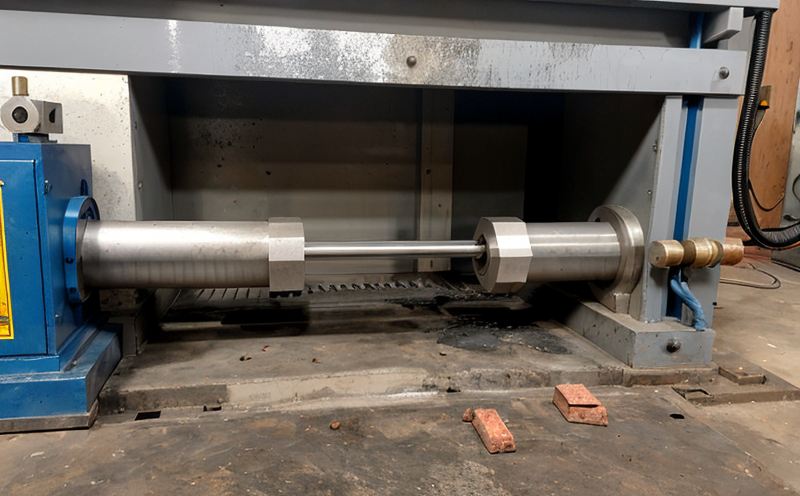ASTM E21 Elevated Temperature Tensile Testing Precision and Accuracy Evaluation Test
The ASTM E21 elevated temperature tensile test is a critical procedure used in metallurgy and materials testing to evaluate the mechanical properties of metallic materials under conditions that simulate real-world operational environments. This test provides insights into how materials behave at high temperatures, which can be essential for designing components that will operate safely and efficiently in harsh or extreme conditions.
The precision and accuracy evaluation of this test are crucial because they ensure that the results obtained are reliable and repeatable. This is particularly important when dealing with materials used in industries such as aerospace, automotive, and power generation, where performance at elevated temperatures can significantly affect product safety and longevity.
During an ASTM E21 test, specimens are subjected to a controlled tensile load while being held at a specified temperature. The test measures the stress-strain relationship of the material under these conditions, providing data on yield strength, ultimate tensile strength, and elongation at break. These parameters are essential for understanding how well materials will perform in service environments where they may be exposed to heat.
One of the key aspects of this testing is ensuring that the test environment replicates real-world conditions as closely as possible. This includes maintaining precise temperature control throughout the test and using appropriate fixtures and grips to prevent slippage or misalignment, which could lead to inaccurate results.
The ASTM E21 test is also used to evaluate the precision and accuracy of the testing equipment itself. By performing multiple tests on the same specimen under identical conditions, it’s possible to assess whether the equipment consistently produces accurate results. This ensures that any discrepancies observed between different samples can be attributed to differences in material properties rather than measurement errors.
The ASTM E21 test is one example of how advanced testing methods are helping industries develop safer and more reliable products. By providing detailed information about materials behavior at elevated temperatures, this test contributes significantly to the design process for components that must perform reliably under extreme conditions.
Understanding the importance of precision and accuracy in tensile tests like ASTM E21 is vital for quality managers, compliance officers, R&D engineers, and procurement professionals who rely on accurate data when making decisions about material selection and product development. Properly conducted tests not only enhance confidence in the performance of materials but also contribute to cost savings by reducing the likelihood of failures due to incorrect choices or poor design.
Given its significance in ensuring reliable results for high-temperature applications, it is clear that ASTM E21 elevated temperature tensile testing stands out as a crucial tool within the broader field of metallurgy and material testing. Its ability to provide detailed insights into how materials behave under extreme conditions makes it indispensable for industries where reliability at all temperatures is paramount.
Why It Matters
The ASTM E21 elevated temperature tensile test holds great importance in several key areas:
- Reliability of High-Temperature Components: Ensuring that materials used in components like turbine blades or engine parts can withstand the stresses they will encounter during operation.
- Safety Assurance: By verifying that materials do not degrade unexpectedly at high temperatures, potential hazards are minimized, protecting workers and consumers alike.
- Cost Efficiency: Identifying weaknesses early in the design process allows for corrective action before costly failures occur in production or use phases.
The precision and accuracy of these tests directly influence the reliability and safety of materials used across various sectors. For instance, aerospace engines operate at very high temperatures; knowing how metals will behave under such conditions is critical to prevent catastrophic failure during flight.
In summary, ASTM E21 testing plays a vital role in ensuring that materials meet stringent performance requirements, thereby enhancing overall product quality and safety while contributing significantly to cost-effective design processes. This makes it an indispensable part of any comprehensive metallurgical and material testing program aimed at addressing the challenges posed by high-temperature environments.
Applied Standards
| Standard | Description |
|---|---|
| ASTM E21 | This standard specifies the procedure for performing tensile tests on metallic materials at elevated temperatures. It covers all aspects of the test, including specimen preparation, testing procedures, and reporting requirements. |
The ASTM E21 standard ensures that all tensile tests are conducted under controlled conditions, providing consistent results across different laboratories. This consistency is crucial for comparing data between various studies or for regulatory purposes where conformity assessment is necessary.
Compliance with this standard also enhances the credibility of test results by adhering to internationally recognized guidelines. It helps in maintaining high standards within the industry and promotes trust among stakeholders involved in material selection processes.
International Acceptance and Recognition
- Global Industry Standards: ASTM E21 is widely accepted by major industries worldwide, including aerospace, automotive, and energy sectors. Its use ensures uniformity in testing procedures across different countries.
- Regulatory Compliance: Many regulatory bodies around the globe require compliance with ASTM standards for certification purposes. This includes organizations like the Federal Aviation Administration (FAA) and European Union Aviation Safety Agency (EASA).
The widespread adoption of ASTM E21 reflects its importance in ensuring product quality and safety across borders. By adhering to these internationally recognized standards, manufacturers can ensure their products meet global expectations without additional adaptation efforts.
For companies operating globally or seeking certification from international bodies, compliance with ASTM E21 is not just beneficial but often mandatory. This underscores the significance of this test in maintaining high standards for materials used in critical applications.





